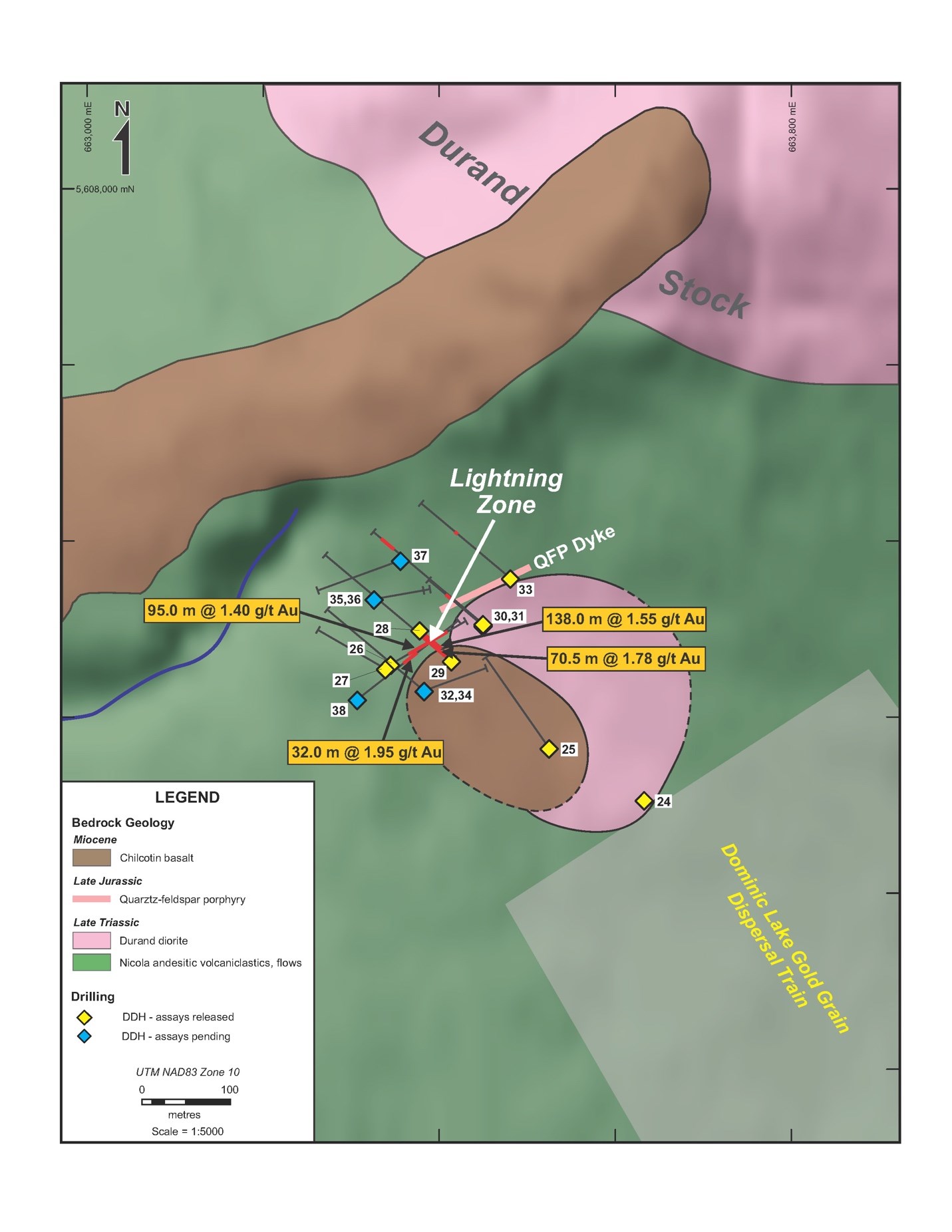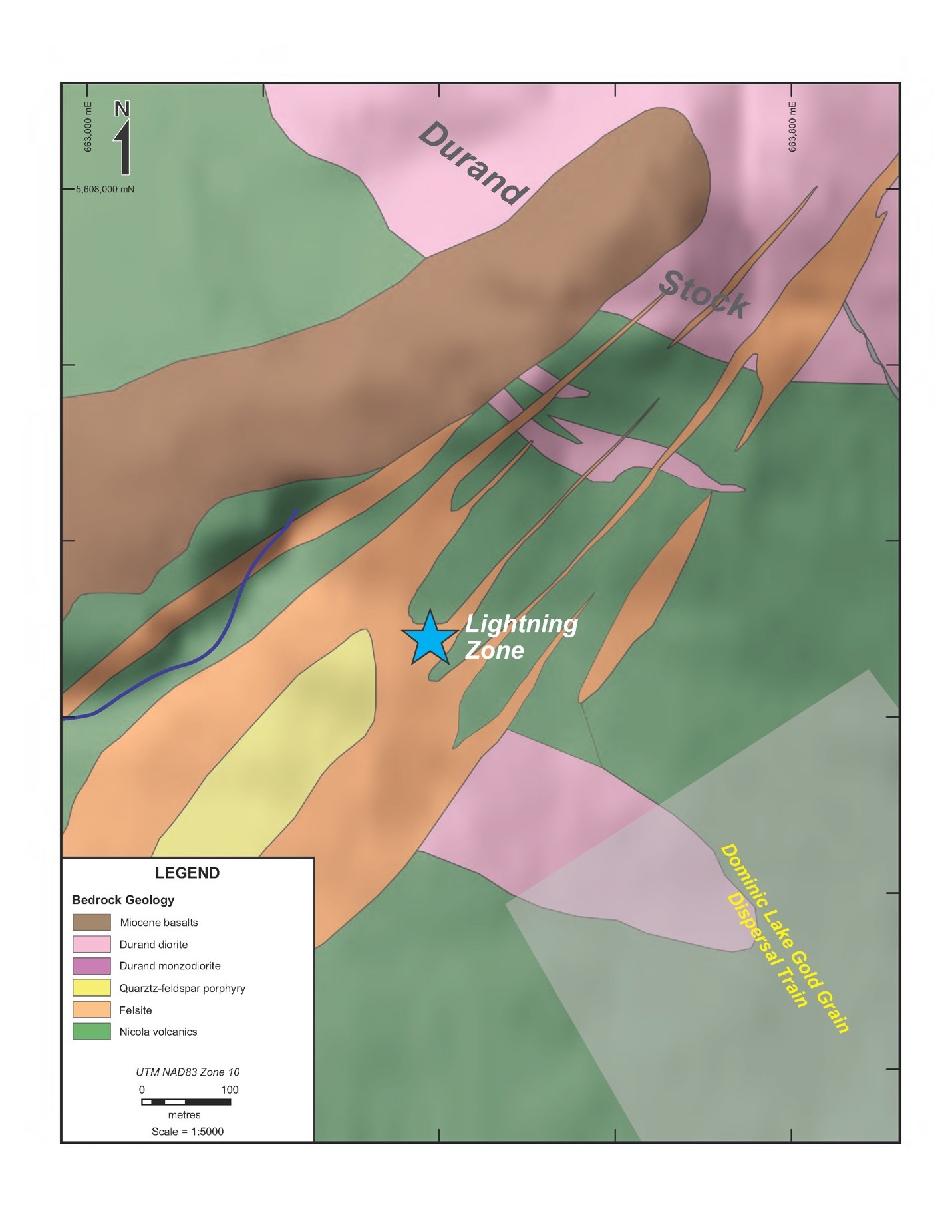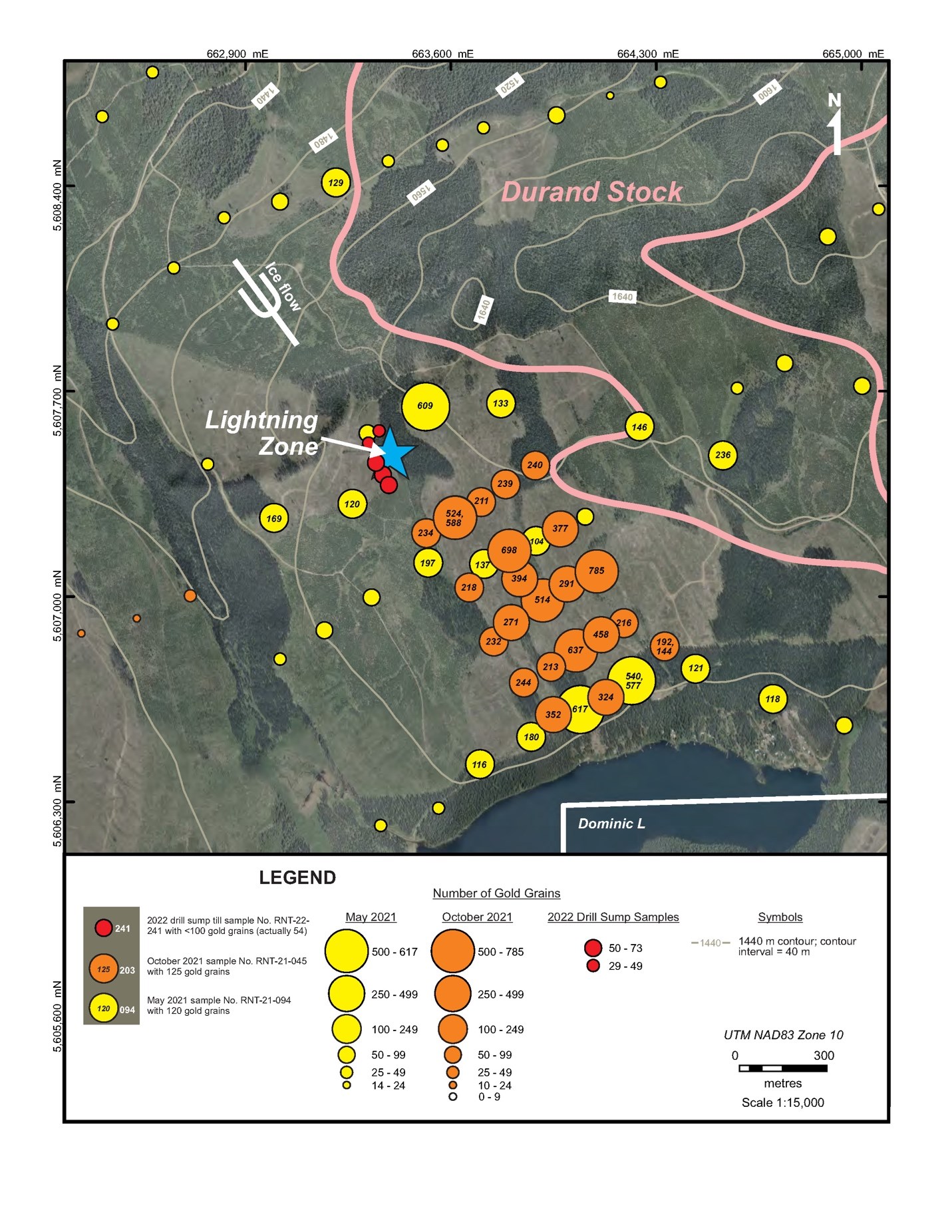Drilling Planned in Early 2023 and Flow-Through Financing Proposed
Vancouver, British Columbia--(Newsfile Corp. - December 21, 2022) - Tower Resources Ltd. (TSXV: TWR) ("Tower" or the "Company") is pleased to provide the results of the recent, five-hole diamond drilling program (see Tower's September 15, 2022 and October 5, 2022 press releases) on the Lightning Zone on the Company's Rabbit North property near Kamloops, British Columbia, between New Gold's New Afton underground Cu-Au mine and Teck's Highland Valley open pit Cu-Mo mine (see Fig. 1).
Program Objective
As reported in the Company's July 13, 2022 press release, the drilling was based on the assumption that the strike of the Lightning Zone was north-northwest rather than east-northeast as initially assumed. Of the five new holes, Nos. RN22-034 to 038 (see Fig. 2), No. 034 was drilled 50 m south-southeast of discovery Hole 026 (1.40 g/t Au over 95 m including 4.42 g/t over 19.3 m; see Tower's January 11, 2022 press release), Holes 035 to 037 were drilled 50-80 m north-northwest of the discovery hole and Hole 038 was collared southwest of the discovery hole to undercut it by ~50 metres.
Same Alteration but Different Au Results
Prior to the present drilling campaign, essentially all strongly sheared and pervasively bleached, silicificified and pyritized tuff sections that were encountered in holes drilled on or near the Lightning Zone contained significant Au. Therefore the presence of this visually distinctive deformation and alteration was inferred to be a reliable indicator of significant, Lightning-type Au mineralization.
As previously reported (see Tower's September 15, 2022 press release), Hole 034 encountered the diorite plug south of the Lightning Zone which is unprospective for Lightning-type orogenic Au mineralization but Holes 035 to 037 all intersected several tens of metres of strongly sheared and pervasively altered tuff visually identical to that hosting the Lightning Zone Au mineralization, confirming the expected north-northwest shear/alteration trend.
As further reported (see Tower's October 05, 2022 press release), the undercut hole, No. 038, intersected 83.2 m of similar alteration including sections of pyritic vein-breccia similar to but more strongly sheared than the breccia hosting the high grade, 4.42 g/t Au mineralization in the overlying discovery hole. With the Au mineralization in the Lightning Zone being so clearly shear controlled, the apparent increase in deformation with depth was considered positive.
While the wide zone of silica-pyrite alteration associated with the north-northwest trending shear zone intersected in Holes 035 to 037 is visually indistinguishable from the alteration in the Lightning Zone it generally contains only anomalous to locally 1 g/t levels of Au, as do some of the most strongly sheared sections in undercut Hole 038. That is, the new north-northwest trending shear zone is largely unmineralized and has sliced through and structurally disrupted the shear zone that hosts the Lightning Zone rather than enhancing the gold zone. As a result, alternating mineralized and unmineralized sections were encountered in Hole 038 instead of a long, continuously mineralized zone as in Holes 026, 28 and 29. The best section averaged 1.95 g/t Au over 32 metres.
Stu Averill, a Director of the Company, explained the short and long-term implications of these findings:
"The low gold results obtained from the north-northwest trending shear zone were unexpected in view of its promising alteration signature and are obviously disappointing. The silver lining is that these results also show that the Lightning Zone accounts for only the western edge of the 400 m wide Dominic Lake gold grain dispersal train, so finding it was serendipitous and actually a bonus. The approximate location of the main gold source is now more obvious than it was a year ago so we should be ready to drill it soon."
Footprint of the Lightning Zone
The surface extent of the Lightning Zone beneath the till appears to be about 50 x 100 m, roughly the area of a football field. The zone has been traced to a vertical depth of approximately 140 m and appears to be approximately the same size at this level. It is presumed to plunge to depth but the plunge direction has not been determined.
The long axis or strike of the gold zone appears to be northeast as originally assumed. Hole 038 intersected a quartz-feldspar porphyry (QFP) dyke similar to the ones intersected in Holes 030 and 033 and previously mapped along a northeast trending structure through the Durand Stock. The QFP appears to have been the engine for the hydrothermal system that introduced the gold mineralization. Significantly, the QFP dyke in Hole 038 is strongly anomalous in Au and a 1.6 m zone bordering its lower contact averages 2.8 g/t.
Inferred Location of the Main Gold Zone
A year ago, when the Lightning Zone was discovered, the existing interpretation of the bedrock geology beneath the till (Fig. 3) was untrustworthy because no outcrops are present. The 15 holes that Tower has since drilled show a very different picture (Fig. 2). The Lightning Zone is on the north side of a previously unknown diorite plug ~300 m in diameter, a satellite of the Durand Stock to the northeast. During the subsequent deformation event that produced the shear zones encountered in the drill holes, this plug would have acted as a buttress, diverting the shearing into the adjacent Nicola volcaniclastic rocks.
The Lightning Zone appears to occur where the curvature of the plug opened dilational shear structures, focusing both hydrothermal fluid flow and the ascension of QFP dykes from an underlying magma chamber. The main gold zone is inferred to occur in a similar but longer dilational structure on the opposite (southern) side of the diorite plug.
Relative Gold Grain Contributions of the Lightning and Main Gold Zone to the Dominic Lake Dispersal Train
The Dominic Lake Train (see Figs. 4) was sampled only as far up-ice as the southern contact of the diorite plug which is well defined because Tower's intersected it in Hole 024 (see Fig. 2). The Lightning Zone's contribution to the gold dispersal train is probably significant only in the sample ~300 m directly down-ice that yielded 524 gold grains (588 grains in the field duplicate; see Fig. 4) because (a) the gold zone thins rapidly northeast along strike from Holes 026, 028 and 029 (see Fig. 2), limiting any gold grain contribution from this part of the zone; (b) till samples collected from some of the wastewater sumps west and northwest (up-ice) of the gold zone during the recent drilling program contained only weakly anomalous levels of ~50 gold grains per sample (see Fig. 4); and (c) the diorite and volcaniclastic rocks immediately south of the gold zone are covered by a patch of Chilcotin basalt flows (see Fig. 2) that is probably an outlier of the larger band of flows north of the gold zone.
The above evidence clearly indicates that the main source of the gold grains in the Dominic Lake Train is along the southern contact of the diorite plug. If the 524-grain response in the till directly down-ice from the Lightning Zone is discounted as being mainly from this zone, the responses in the other samples along the same traverse are significantly lower than those on the traverses further down-ice. This apparent drop in the gold grain content of the till further indicates that the main gold source is nearby, on or close to the southern contact of the diorite plug.
Next Steps
As explained in Tower's November 22, 2022 press release the Au content of the till in the new Central Train 400 m west of the Dominic Lake Train (see Fig. 5) is three times higher than that in the latter train even though the number of gold grains per sample is lower. The source of the Central Train is also tightly constrained by the band of Chilcotin basalt flows to the north. Therefore Tower plans to drill this target first while further refining the location of the main source of the Dominic Lake Train as a priority in a planned drill program of 2,000m in early 2023.
Simultaneously, Tower plans to collect additional till samples on lines 50 to 150 m up-ice from the sampled limit of the Dominic Lake Train to pin down its source. With the ground now frozen, these samples will be collected with the excavator that prepares the drill sumps. The gold grain results for these samples should be available within two weeks of collection, allowing a follow-up drill test to be performed immediately if warranted.
Flow-Through Financing
The Company is also pleased to announce a non-brokered flow-through private placement for aggregate gross proceeds of up to CAD$700,000 (the "Offering"). Under the Offering, the Company will issue flow-through units (each, a "FT Unit") at a price of CAD$0.18 per FT Unit. Each FT Unit is comprised of one (1) common share in the capital of the Company that qualifies as a "flow-through share" for the purposes of the Income Tax Act (Canada) (each, a "FT Common Share") and one (1) non-transferable common share purchase warrant (each whole warrant, a "Warrant"). Each Warrant entitles the holder to purchase one (1) non-flow-through common share in the capital of the Company (each a "Common Share") at price of CAD$0.36 per Common Share for a period of 24 months from the date of issuance. The proceeds from the Offering will be used for expenditures that qualify as Canadian Exploration Expenses, within the meaning of the Income Tax Act (Canada), to carry out exploration programs on the Company's Canadian properties.
In connection with the Offering, the Company may pay finder's fees equal to 6% of the gross proceeds from the Offering and finder warrants equal to 6% of the total number of FT Units sold by an eligible finder under the Offering (each a "Finder Warrant"), each Finder Warrant entitling the holder to purchase one (1) Common Share at a price of CAD$0.18 for a period of 24 months from the date of issuance, in accordance with the policies of the TSX Venture Exchange (the "Exchange").
All securities issued under the Offering, including securities issuable on exercise thereof, will be subject to a hold period expiring 4 months and 1 day after issuance, in accordance with the rules and policies of the Exchange and applicable Canadian securities laws.
Methods and Qualified Person
The drill core was logged at Tower's leased, fully equipped core facility near Kamloops under the supervision of Matthew Husslage, BSc. P. Geo., and Dane Bridge, MSc., P.Geo., both of whom have extensive experience with shear-hosted gold deposits and have previously worked on the Rabbit North property.
Split samples of the core, generally 1-2 m in length, were delivered directly to Activation Laboratories (ActLabs) in Kamloops, BC, a laboratory certified as ISO/IEC 17025 Accredited (Lab 790) by the Standards Council of Canada. QA/QC samples including blanks and standards were inserted regularly into the sample sequence at a ratio of approximately 1:20.
The samples were analyzed for Au by fire assay and ICP-OES and for Ag and 36 additional elements by ICP-OES using a four-acid, near-total digestion. Any over-limit (>5 g/t) Au analyses were repeated using the same fire assay procedure but with a gravimetric rather than ICP finish.
The technical content of this news release has been reviewed and approved by Stuart Averill, P.Geo., a Director of the Company, and a Qualified Person as defined by National Instrument 43-101.
About Tower Resources
Tower is a Canadian based mineral exploration company focused on the discovery and advancement of economic mineral projects in the Americas. The Company's key exploration assets, both in B.C., are the Rabbit North copper-gold porphyry project located between the New Afton copper-gold and Highland Valley copper mines in the Kamloops mining district and the Nechako gold-silver project near Artemis' Blackwater project.
On behalf of the Board of Directors
Tower Resources Ltd.
Joe Dhami, President and CEO
(778) 996-4730
www.towerresources.ca
Reader Advisory
This news release contains statements that constitute "forward-looking information," including statements regarding the plans, intentions, beliefs, and current expectations of the Company, its directors, or its officers with respect to the future business activities of the Company. The words "may," "would," "could," "will," "intend," "plan," "anticipate," "believe," "estimate," "expect," "must," "next," "propose," and similar expressions, as they relate to the Company or its management, are intended to identify such forward-looking information. Without limiting the generality of the foregoing statements, the proposed use of the proceeds of the Offering is forward-looking information. Investors are cautioned that statements including forward-looking information are not guarantees of future business activities and involve risks and uncertainties, and that the Company's future business activities may differ materially from those described in the forward-looking information as a result of various factors, including but not limited to fluctuations in market prices, successes of the operations of the Company, continued availability of capital and financing, and general economic, market, and business conditions. There can be no assurances that such forward-looking information will prove accurate, and therefore, readers are advised to rely on their own evaluation of the risks and uncertainties. The Company does not assume any obligation to update any forward-looking information except as required under the applicable securities laws.
Neither TSX Venture Exchange nor its Regulation Services Provider (as that term is defined in policies of the TSX Venture Exchange) accepts responsibility for the adequacy or accuracy of this release.
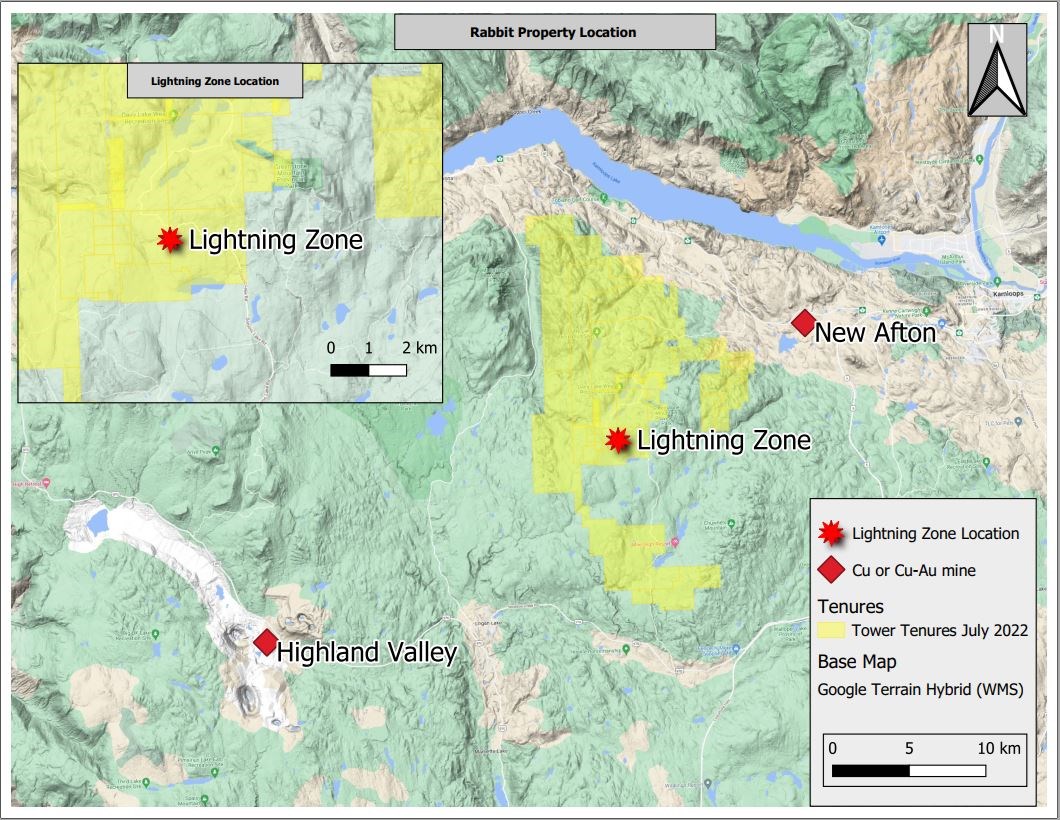
Figure 1 - Location of Tower's Rabbit North property relative to the active mines of the Kamloops district.
To view an enhanced version of this graphic, please visit:
https://images.newsfilecorp.com/files/5023/148979_fff05a5a745c89ec_002full.jpg
Figure 2 - Highlight gold intersections of the Lightning Zone. The bedrock geology has been interpreted from Tower's 15 diamond drill holes.
To view an enhanced version of this graphic, please visit:
https://images.newsfilecorp.com/files/5023/148979_fff05a5a745c89ec_003full.jpg
Figure 3 - Interpreted geology of the Lightning Zone area prior to Tower's diamond drilling.
To view an enhanced version of this graphic, please visit:
https://images.newsfilecorp.com/files/5023/148979_fff05a5a745c89ec_004full.jpg
Figure 4 - Gold grain results from recent till samples collected from diamond drill wastewater sumps. The low, ~50 grains per sample gold results obtained from these samples both (a) constrain the western and northwestern limits of the Lightning Zone; and (b) show that the main source of the Dominic Lake gold grain dispersal train is further southeast near the northern sampled limit of the train.
To view an enhanced version of this graphic, please visit:
https://images.newsfilecorp.com/files/5023/148979_fff05a5a745c89ec_005full.jpg
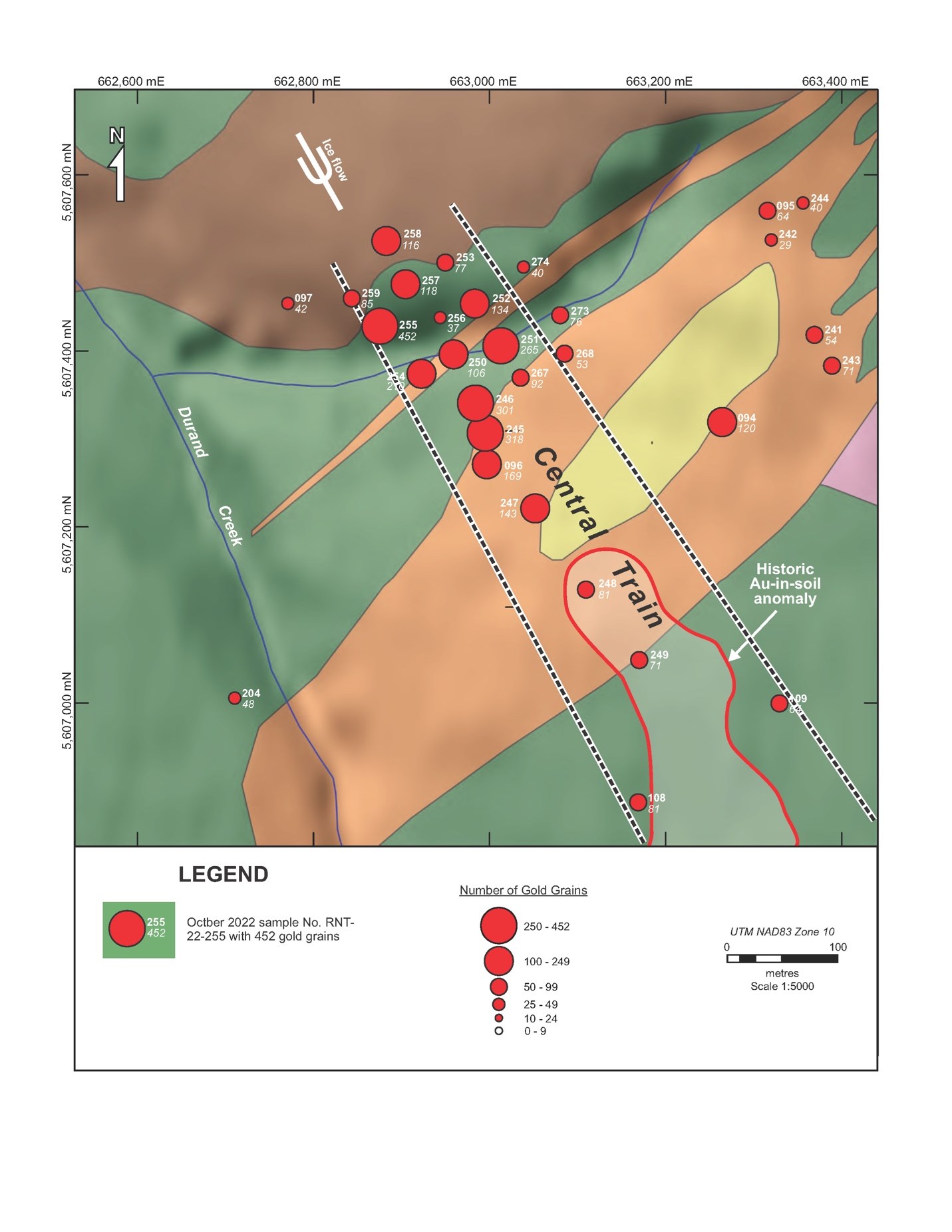
Figure 5 - Geological setting of the Central Train as determined from Tower's recent diamond drilling.
To view an enhanced version of this graphic, please visit:
https://images.newsfilecorp.com/files/5023/148979_fff05a5a745c89ec_006full.jpg
NOT FOR DISTRIBUTION TO U.S. NEWSWIRE SERVICES OR FOR DISSEMINATION IN THE UNITED STATES. ANY FAILURE TO COMPLY WITH THIS RESTRICTION MAY CONSTITUTE A VIOLATION OF U.S. SECURITIES LAWS.
To view the source version of this press release, please visit https://www.newsfilecorp.com/release/148979


